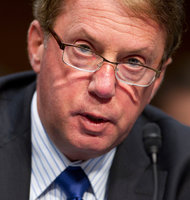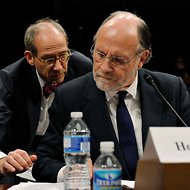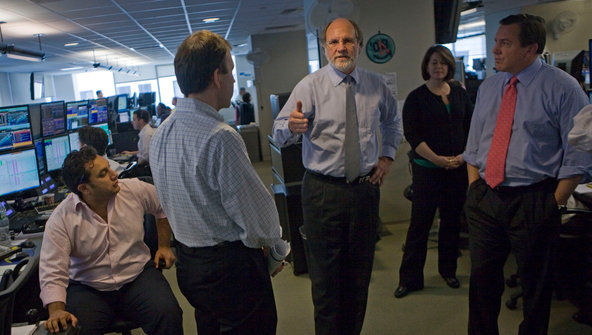 Andrew Harrer/Bloomberg NewsTerrence Duffy of the CME Group testified at a Senate hearing about MF Global’s missing funds.
Andrew Harrer/Bloomberg NewsTerrence Duffy of the CME Group testified at a Senate hearing about MF Global’s missing funds.
Federal authorities investigating the collapse of MF Global have expanded their inquiry to include the actions of the CME Group, the operator of the main exchange where the commodities brokerage firm conducted business, according to people briefed on the matter.
CME, which also served as MF Global’s primary regulator, has come under heavy criticism after $1.2 billion in customer money disappeared from MF Global. The Commodity Futures Trading Commission, the government agency leading the case, is now scrutinizing CME’s conduct in the days before MF Global filed for bankruptcy on Oct. 31.
In particular, the commission is reviewing whether CME’s efforts to verify the safety of customer funds were sufficient, the people said.
CME, for its part, has said that MF Global may have intentionally produced inaccurate documents related to customer accounts.
As the owner of the Chicago Mercantile Exchange, the Chicago Board of Trade and the New York Mercantile Exchange, the CME Group is a major force in commodities and futures. It is the dominant United States exchange operator for billions of dollars in trades, affecting food prices and Wall Street profits. A censure of any kind would be a powerful, if merely symbolic, critique of the behemoth.
If the C.F.T.C. finds that CME did not meet the standards of so-called self-regulatory organizations, it could fine or sanction the exchange. The commission could also revoke CME’s status as a self-regulator, though that is unlikely. Experts say it is rare for the government to hand down any manner of sanction against a self-regulatory body.
CME has not been accused of any wrongdoing, and the review of its actions may not produce any findings.
“Given the issues involved, we welcome and expect the C.F.T.C.’s investigation as a natural part of this process,” a spokeswoman for the CME Group said in a statement. “We are confident the C.F.T.C.’s review will determine we did everything right within our regulatory power. The system did not fail; the firm broke the law by misusing customer funds.”
The collapse of MF Global — and the ensuing hunt for the missing money — has rippled through Wall Street, Washington and the Farm Belt. Creditors are fighting for their cut in bankruptcy court, lawmakers are holding Congressional hearings and farmers and other clients are waiting for their money to reappear.
Don Laird, a retired investor in Texas, says he is still trying to get back hundreds of thousands of dollars of his money that was at MF Global.
“I think CME should be investigated for failure to regulate, and that investigation should involve what liability they should have for any losses MF Global customers suffer,” he said.
Regulators, chastened that the debacle occurred on their watch, are searching for the money while also trying to prevent the next MF Global from happening. As part of that effort, the C.F.T.C. is close to finishing “limited reviews” of customer accounts at the 14 largest futures brokers.
The results of these cursory reviews, which include divisions at Goldman Sachs and JPMorgan Chase, are expected to be released in the next few weeks, according to one of the people briefed on the matter.
But there are roughly 100 futures brokers, so the government has called on financial industry self-regulators to assist with the spot checks, including the National Futures Association, which recently finished looking at 19 institutions and found no problems, according to a person with direct knowledge of the matter.
The government has also called on CME to assist. Notwithstanding the government’s scrutiny of its actions, CME agreed to review 33 futures firms. So far, the profit-making exchange has completed 31 of them.
The first inkling that something was amiss between the exchange and the government came about three weeks ago. At a Congressional hearing in December about MF Global, Terrence Duffy, the executive chairman of the CME Group, told lawmakers that his exchange was asked to back away from the investigation into missing customer money at the brokerage firm.
Asked for an explanation by members of the House Financial Services Committee, Mr. Duffy said: “I guess you’d have to ask the C.F.T.C. why. I don’t know.”
But the agency was concerned that a separate inquiry by CME would complicate efforts to discover wrongdoing at MF Global. Many government agencies, including the Federal Bureau of Investigation, are already investigating the case. David Meister, the chief of the C.F.T.C.’s enforcement division, asked CME to step aside from the investigation during a conference call with the exchange’s lawyers, said people briefed on the phone call. It is not clear whether Mr. Meister indicated that his division was also scrutinizing CME.
A spokesman for the C.F.T.C. declined to comment.
One question for authorities is why CME appeared to be slow to respond to the crisis enveloping MF Global in the week before its bankruptcy.
The publicly traded exchange did not dispatch employees to MF Global’s Chicago headquarters until Oct. 27, three days after Moody’s Investors Service cut its rating on the brokerage firm, sending it into a tailspin.
When CME officials arrived at MF Global, they reviewed the firm’s latest statements of customer accounts to ensure client money was safe. Documents indicated the funds were secure, the CME said.
But then the money vanished, and CME pointed the finger at MF Global.
The exchange said that MF Global might have shifted client money “in a manner that may have been designed to avoid detection.”
“It appears that any transfer of such funds occurred after the completion of CME audit procedures,” the exchange said in a statement shortly after the Oct. 31 bankruptcy filing.
But CME never completed an audit, a point officials later conceded when pressed by lawmakers. Instead, CME said it was a spot audit, though they did not complete that either.
CME was unable to verify the customer accounts because MF Global did not hand over needed information corroborating the account statements, according to a submission it made to Congress.
But that did not stop exchange officials from heading home for the weekend at about 6 p.m., on Friday, Oct. 28.
The officials did not return until that Sunday afternoon, after an apparent shortfall in customer funds was discovered.
The fallout has left some customers questioning a model where firms like CME profit from the institutions they regulate.
Other customers are more sanguine, however, adopting a wait-and-see approach when it comes to their missing money and the exchange’s culpability.
John Spangler, a farmer in Marietta, Ill., and his wife, Holly, say CME has operated flawlessly through the many years they have traded corn and soy futures.
Though they are concerned about getting back their money, which amounts to a few thousand dollars, they have not lost faith in the industry.
“As long as the CME comes through with everything, I don’t think there will be any problems,” Mr. Spangler said. “If they don’t,” he said, “things are going to need to change.”
This post has been revised to reflect the following correction:
Correction: January 6, 2012
An earlier version of this post misspelled the surname of Don Laird, a retired investor in Texas, as Baird.
Article source: http://feeds.nytimes.com/click.phdo?i=170e42dcdb505122c4bfc3e21bfa1e55


